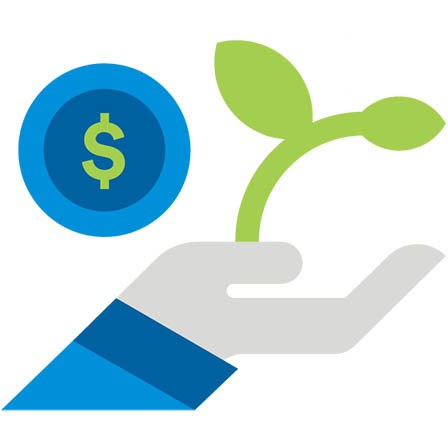Taking withdrawals while still employed
In-Service Withdrawals
When you need cash to pay bills or make a major purchase, it can be tempting to turn to your retirement account. But taking money out of your retirement account while you’re still working (known as in-service withdrawals) could hurt your long-term financial outlook, especially in retirement. Depending on the options your plan offers, you will want to carefully consider the pros and cons before withdrawing money from your retirement savings.
Three reasons to avoid taking early withdrawals
Taxes
Early withdrawals are subject to federal income taxes, and depending on where you live, state income taxes.
Early Withdrawal Penalties
Depending on the type of plan the funds are withdrawn from, you may have a 10% penalty tax as well (457 plans are not subject to the 10% early withdrawal penalty).
Missing on Compound Interest
Money that doesn’t stay invested loses the chance to grow through compounding.
Since your plan is designed primarily to help you save for retirement, the Internal Revenue Code (IRC) has placed restrictions on when money may be withdrawn from your plan account before you retire. Money may be withdrawn from your plan account under the following circumstances, in accordance with your employer’s plan document:
- Termination of Employment
- Disability (Subject to IRC requirements)
- Death
- In-Service Withdrawals (As defined by your plan)
- Hardship (Subject to IRC requirements) Always consult your tax advisor about the income tax consequences of any withdrawals. Ordinary federal income taxes generally apply (unless distributed from Roth accounts qualifying for tax-free distributions). State income taxes may also apply. Distributions before age 59½ may be subject to an additional 10 percent tax penalty, unless an exception applies.
Loans
Borrowing money from your retirement account can be a convenient way to meet a financial need — but the drawbacks can affect you in the long-run. Look into other borrowing options before you decide.
Pros |
Cons |
Test |
|---|---|---|
There’s no loan application or credit report requirement. |
There’s a borrowing limit, which varies by plan. Loans also typically have to be paid back within five years unless it’s for the purchase of a primary residence. Check you plan for details. |
Column 3 |
You’re borrowing your own money. |
Payments are made on an after-tax basis and may be taxed again upon withdrawal. |
Column 3 |
The loan can cover current debts at a potentially lower rate. |
Less money in your account means there is less opportunity for growth. You can miss out on compound earnings that could be higher than the interest that you are paying. |
Column 3 |
You don’t pay income taxes or receive a penalty on the amount borrowed. |
If you leave employment before repaying the balance, you may have to pay it off in full. If you don’t, any unpaid balances that remain may be subject to federal income taxes and a 10% early withdrawal penalty if you’re under 591/2. It may also be subject to state tax, depending on where you live. |
Column 3 |
You are paying yourself interest. |
Your long-term investment strategy could be disrupted. Since the amount you borrow is no longer being invested, the way your assets are allocated could deviate from what you intended. |
Column 3 |
Other options to consider
There may be other ways to meet your short-term financial needs with less long-term impact. Here are several to consider:
- Reach out to creditors. If you're experiencing temporary challenges that are preventing you from paying your bills, contact creditors to ask about options. You may be able to work out a payment plan or pause payments.
- Reduce expenses. Look for line items in your budget to cut, even temporarily. Lowering your monthly costs can free up money to put toward debt or other goals.
- Check into other borrowing options that are available to you. Be sure to compare terms and interest rates to understand the details before you decide what’s best for you.
Carefully consider the long-term impact before taking money from your retirement savings. There may be other solutions to your current financial needs.


